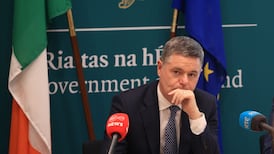The European Central Bank (ECB) has left euro zone interest rates on hold for a second straight month as it weighs up the outlook for inflation amid a slowdown in trade and political turmoil in France.
The bank’s upgraded forecasts for inflation this year and next were, however, interpreted as lessening the chance of the another rate cut in the current cycle.
The governing council kept the bank’s key deposit rate at 2 per cent, a move that was widely expected, with ECB president Christine Lagarde insisting the bloc was “in a good place” with inflation at 2 per cent.
She reiterated that the bank would not pre-commit “to a particular rate path” and that decisions would be “data-dependent”.
READ MORE
The ECB raised its inflation projections for this year and next by a tenth of a percentage point suggesting price growth across for the bloc would average 2.1 per cent in 2025 and 1.7 per cent in 2026.
With inflation expected to fall below its 2 per cent target rate next year, markets have been pricing in at least one more rate cut in the current cycle.
Policymakers have, however, emphasised that the bar for another interest rate cut remains high.
Bundesbank president Joachim Nagel recently described the economy as being in a “kind of equilibrium,” with inflation and rates both at 2 per cent.
Several market commentators said the ECB’s new inflation projections combined with Ms Lagarde’s comments lessened the chance of another rate cut.
“Although the press release was mildly dovish, with the reference to the euro zone’s economic resilience removed, president Lagarde dispelled bets for further easing during her press conference,” Michał Jóźwiak, market analyst at global financial services firm Ebury, said.
“Lower trade uncertainty and a more balanced growth outlook were repeatedly emphasised,” he said.
“The strength of the labour market and the resilience of domestic demand were also underlined, and the 2025 growth forecast was revised upwards,” he said.
“The bank does not appear to be excessively worried about inflation, saying that it is in a good place and should remain there in 2026,” he said.
The bloc is facing several challenges with political deadlock in France threatening to choke off investment and the outlook for German exports diminishing in the face of greater trade protection.
As part of its rate announcement, the council upgraded its growth forecast for the bloc to 1.2 per cent this year from 0.9 per cent previously amid the fast-tracking of product into the US earlier in the year.
However, it trimmed next year’s projection from 1.1 per cent to 1 per cent on the back of falling global demand linked to greater trade protection.
Frankfurt’s main lending rate, to which ECB tracker mortgages are linked, was left at 2.15 per cent.















